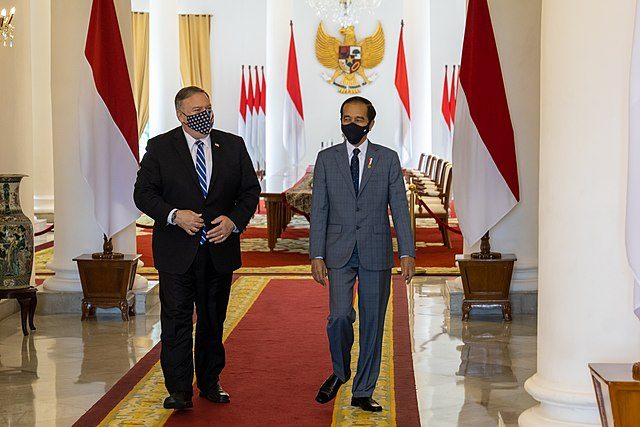After its revival in 2017, the Quadrilateral Security Dialogue (Quad) reached a new milestone by assembling its first summit on March 12th 2021. The informal security alliance comprised of the United States, Japan, India, and Australia is still nascent compared to the existing regional fora initiated by ASEAN. Yet, the advent of new bloc implicitly questioned the relevance of old players; Indonesia and the institution it leads are no exception.
The primary concern regarding the Quad is whether the initiative will complement or sideline the existing regional architecture built by ASEAN. Accordingly, ASEAN has long been the cornerstone of Indonesia’s diplomacy, manifesting its “free and active” principle in the regional domain. To navigate great power rivalry, ASEAN has been driven to build several forums where neutrality is assured.
With China becoming more assertive in the past decade, however, the US and Quad countries find it necessary to step beyond ASEAN. The late Trump administration demonstrated the efforts to make Indonesia and ASEAN member-state align with US’s grand strategy. Last year’s visit by US Secretary of State Mike Pompeo to Jakarta, and the decision to lift the travel ban on Defence Minister Prabowo Subianto, further prove Washington’s motivation.
However, Indonesia remained lukewarm towards Quad. The 2019 elite survey from the ISEAS-Yushof Ishak Institute revealed that Indonesia, alongside Malaysia, Laos, and Thailand, is among the top ASEAN sceptics regarding this new initiative. Realising its leadership profile is at stake, it’s natural for Indonesia to pursue an institutional response. Indonesia attempted to demonstrate the institution’s continuing relevance in grappling with the “Indo-Pacific” concept by initiating the draft of the ASEAN Outlook on the Indo-Pacific (AOIP), which was adopted in the 2019 ASEAN Summit.
Alas, the initiative is heavily underinvested and resulted in little to no strategic outcome for ASEAN. As mentioned by Evan Laksmana, a researcher from Centre for Strategic and International Studies, AOIP was “defective at birth” due to lack of actionable policy and the false assumption that the existing ASEAN mechanism is adequate to address current strategic challenges in the region. The same goes for the vision of Global Maritime Fulcrum that has long gone unmentioned since President Jokowi introduced the plan in 2014.
To begin with, Indonesia doesn’t have any coherent Indo-Pacific strategy, let alone to deal with the Quad. To paraphrase strategic analyst Yohanes Sulaiman’s policy paper, Indonesia’s Indo-Pacific foreign policy is driven by the lack of alternatives, rather than a coherent strategy. The latest Indonesia defence white paper dates as far back as 2015. Moreover, the document barely addressed the latest strategic challenges in the region.
Public opinion should force the Indonesian government to consider and adjust its policies and responses to China in the South China Sea.
Public opinion and civil society: shaping Indonesia’s South China Sea Policy?
Mixed responses from different ministries when China’s fishing vessel trespassed on Natuna Islands in 2016 and 2019 further show Indonesia’s bureaucratic mismatch when it comes to external threat. Aside from economic and socio-cultural cooperation, Indonesia barely has a strategic policy up its sleeve.
As well as Indonesia, the Quad is eyeing other ASEAN countries that can possibly be incorporated. Although the region did not fully embrace the Quad, some countries have shown their support to offset China’s dominance through this initiative. Among the top supporters of the Quad were Vietnam and the Philippines, which both face a looming threat from China next to their border. The latter, in particular, was lately on the verge of losing, yet again, another part of its South China Sea territory in the Whitsun Reef.
Indonesia could insist on playing its “free and active” card and reiterating ASEAN centrality as much as it can. Yet, the outcome will be naught if ASEAN members themselves find it realistic to invest more in another regional structure and through a non-ASEAN pathway. Even more so, if ASEAN’s dialogue partners who have less liability to commit in the organization take the same path.
Escalating tension with China eventually led a country like India, which traditionally adhered to the “non-aligned” principle, closer to the US. Some observers attributed India’s last-minute withdrawal from the Regional Comprehensive Economic Partnership (RCEP) in 2019 partly to a fear that RCEP will pave the way for China’s dominance; this was a huge loss for Indonesia, who initiated the deal.
Neither joining an US-led alliance nor abandoning ASEAN are the options. However, Indonesia’s half-hearted engagement makes ASEAN less appealing to its partners. One can argue that the US’s low engagement with ASEAN was driven by Trump’s strategic fallacy in the region. But, what if the opposite is true? What if Indonesia and ASEAN were no longer seen as relevant anchors by their long-term partners?
Indonesia often takes its strategic potential for granted, be it primacy in ASEAN or its geographic position at the confluence of Indo-Pacific. Even worse, the current administration seem less interested in foreign policy; foreign issues such as the Quad gain less attention due to their unpopularity with domestic audiences.
Fortunately for Indonesia, Quad countries realised that they can’t countervail China with the absence of ASEAN. Four years of Trump administration has proved that the cooperation can’t eschew the pre-existing regional architecture to achieve its goal. ASEAN also remains steadfast in defending its centrality whenever it’s forced to choose between the two camps.
Moreover, the latest Quad Summit in March 2021 affirmed that the grouping will support ASEAN centrality, delivering a signal that the two can go on an equal footing. In fact, the revival of Quad after ten years of hiatus in 2017 took place on the sidelines of the ASEAN Regional Forum summit in Manila. The underlying message behind that is that the Quad needs ASEAN more than ASEAN needs the Quad.
Several steps can be considered to regain centrality in the region, for instance by increasing ASEAN and Indonesia’s foreign policy budget, further institutionalising the East Asia Summit, and allowing the possibility of ASEAN-minus-X to deal with short-term crises. The latest regional conflict has demonstrated that ASEAN needs a revamp in order to stay valid.
The potential is there, yet it can’t be utilised if Indonesia’s ASEAN and Indo-Pacific policy are under-resourced. Most recently, for instance, inaction on the crisis in Myanmar has further put Indonesia’s ASEAN leadership at stake. Indonesia should go the extra mile in order to stay relevant; not only in answer to the Quad’s concern, but also to regional challenges in the near future.
 Facebook
Facebook  Twitter
Twitter  Soundcloud
Soundcloud  Youtube
Youtube  Rss
Rss 



